- Home
- Taylor Caldwell
The Sound of Thunder Page 5
The Sound of Thunder Read online
Page 5
“I’ll come to see you,” said Edward. But he knew, he knew. He would never see Margaret again. Margaret Proster. In the P’s. He was only fourteen and Margaret was only ten, but he loved her. He wanted to touch her hair, to smooth the back of his hand against her cheek, to rub her dimpled chin. He loved her as a man loves a woman. He wanted to shelter her hungry body in his strong arms, and take care of her forever. Forever. Something nagged at his mind. He whistled dolorously and thought: All the days of my life.
CHAPTER II
Heinrich had great terror of and respect for the law. Edward had once tried to explain that laws were made by men, the mundane laws apart from the natural laws of God, and that foolish laws could be broken, and should be broken. He had even quoted Thomas Jefferson (his hero) to that effect. “But what is this Thomas Jefferson?” Heinrich has asked petulantly. “Law is law; it must be obeyed, not broken, not changed.”
“But this is America,” Edward had said.
Heinrich had only looked at him reproachfully and anxiously. Laws were immutable. One learned that in the old country.
So, on the very striking of eight o’clock, Heinrich resolutely closed his shop on Sundays and refused to serve any customer hastening in, pleading. “It is the law,” Heinrich would say, locking the till. “But my baby needs milk. I forgot until the last minute,” the woman might plead. “It is the law,” Heinrich would say, with distress, wondering how customers could be so stupid as not to understand.
When his back was turned, Edward would sometimes drop a bottle of milk in a bag, thrust it into the customer’s hand, and whisper that she could pay another time. It had happened tonight; the mother of five children had rushed in for a loaf of bread. Heinrich talked of law and turned his back; Edward gave her the bread. There was no use arguing with Pa, to whom law was a dragon that must be placated by absolute obedience. I’d sure hate to be living in Europe, Edward had thought, nodding pleasantly to the woman who hid the bread under her apron, thankfully.
Father and son, after carefully locking the doors, walked homeward in the warm blue darkness of the summer night. The churches were not yet spilling out their throngs of worshipers. The windows of houses showed golden rectangles through the trees. Edward looked up at the moon; it was great and red, almost a fiery red, and he pointed it out to his father, who stopped to contemplate it. Heinrich was a worrier. He regarded the moon with alarm and shook his head. “On the moon, it is blood,” he murmured. “For ten years, before the war between France and Germany, there were moons with blood on them. It is an omen.”
“Now, Pa, don’t start worrying,” said Edward. “Where’s there even anybody thinking of wars? Sure, we had the Spanish-American War, a little war, and Teddy Roosevelt, charging around, thought it was made just for him. But no other wars.”
“There will be a war,” said Heinrich with sad positiveness. “You will see.”
They walked on, their heels clacking softly on the walks. Edward whistled tonelessly between his teeth. Then he cleared his throat. “Pa, I’ve been wanting to ask you for a long time. Your flute. Could I use your flute once in a while?”
“My flute, you, my son?” Heinrich was astonished. “It is not you who is the musical genius. It is David.”
“I’d still like to use the flute, Pa. I can read notes. I learned some in school and I’ve taught myself to read better. Bet you I can learn to play the flute pretty good!”
Heinrich considered, worried again. He understood these things. The mediocre soul attempting to express itself. But that led to envy and frustration. He winced in himself. Besides, it would disturb the pure genius of his oldest son, David, to hear the shrillness of a flute at the lips of one born only to serve. He shook his head. “Ach, no, Eddie. That would not do. One must think of the sensibilities of David.” He relapsed into German. “It is hard to comprehend these things. You would practice in the house. The mother would shiver. It would destroy the harmony, the little harmony that exists in a house blessed by many with the artistic temperament. You would be unhappy; the others, who have delicate souls, would be devastated. I am thinking of your harmonica. You had to give it away, at last, and you paid two dollars for it. It hurt the ears.”
I played the harmonica very well, thought Edward, with some anger. I didn’t hurt anybody. Miss Johns had me play at Christmas. He shrugged. “All right, Pa, don’t worry. Keep your flute. For some grandchild.” He patted his father’s fat shoulder and Heinrich sighed. “You are so sensible, Eddie. You understand.”
A feller sometimes gets tired of understanding, Edward reflected. But understanding was demanded of people who weren’t geniuses. It was the least they could do for the gifted ones. Besides, he loved his father deeply and tenderly. Nothing must disturb Pa, so harried in “a house blessed by many with the artistic temperament.”
“Genius cannot be acquired,” said Heinrich. “All else can, to further that genius.” They walked along in mutual silence; then Heinrich, with tears in his voice, said: “I must confess something to you, my son, something I have never confessed to another. I was not a genius; I played the flute only adequately, in spite of many years of prayer and pain and study. What are these if one is not gifted? For years I did not know the truth.”
“Sure, Pa,” said Edward, with pity.
“It isn’t enough for a man’s soul to be moved by music, to adore music, to comprehend it,” Heinrich went on, with grief. “I suffered, and still suffer, these things. When I listen to Beethoven or Wagner, I am changed, I am illuminated, I am transported to another realm. Yet, on my flute, I was the squeak of a mouse. I was the crow in the forest. It was the mother who finally enlightened me, with her superior knowledge and honesty. But I have done very well in the shop,” he added with a pleading note in his voice, an asking note.
“Wonderful,” said Edward. It was probably true that Heinrich was no genius, but it was also true that Maria Enger could be coldly objective. “One of these days,” said Edward, “we’ll expand. We’ll have a lot of clerks. We’ll have the best delicatessen in the whole country! Why, we can do like the Atlantic & Pacific! We can have branch delicatessens. With you supervising and buying.”
Heinrich touched his son’s sleeve paternally and with indulgence. “Ach, Eddie, you have the soaring mind. That is because you are young. There must be restraint, prudence.” Edward did not answer. Heinrich looked at the moon again and pursed his lips. “It is blood there,” he said.
They were two streets from home now. Heinrich stopped and rubbed his forehead, after removing his stiff straw hat. He coughed. “Eddie,” he said. Edward stopped also and grinned. “A pinochle game, eh? All right, Pa. You go ahead and have your game with Mr. Wolfsohn. I won’t snitch.”
“Such language. If you cannot speak correctly, in this English, you must learn to do it.” But Heinrich smiled uneasily. “This ‘snitch.’ It is sneak, is it not?”
“Sure, Pa. I won’t sneak.”
Heinrich rolled the brim of the hat in his little plump hands. “It is, of course, still Sunday,” he said, uncertainly.
“There’s no law against playing pinochle on Sundays,” said Edward, with affectionate impatience. “And isn’t there something in the Bible about the Sabbath being made for man and not man for the Sabbath?”
Heinrich rebuked him. “It is very bad, Eddie, that you have no interest in church.”
Edward did not remind his father that the household was so arranged, and all his work, that he did not have time for such an interest. Heinrich went on: “Yes, it is true, the Sabbath for man. Besides,” he continued, with more spirit, “when Meyer and I play pinochle on Sunday, I give my winnings to the church plate. It is working for good, hein?”
“Sure, Pa, sure. Besides, it isn’t Mr. Wolfsohn’s Sabbath. His was yesterday. There’s no sin on his soul. Not that there’s any on yours, either,” Edward added hastily. “I’m sure God won’t hold pinochle against you.” He laughed, a vision coming into his mind of his father explaining miserably
to the Shining Host. Poor Pa, who had no pleasure except those small games and an occasional glass of beer!
“Tonight,” Edward said earnestly, “you go ahead and have that beer. It’s hot and you deserve to have a cold drink. I won’t sneak. And I’ll tell Ma that—now what excuse can I give her tonight?”
They stood under a street lamp and gave all their serious attention to this matter. “We can’t say a sick friend,” said Edward. “We used that three times before. How about me saying that you stayed at the store to do some extra cleaning up?”
Heinrich frowned. “But then the mother will reproach you, asking why you had not stayed.” He said this simply, with no thought of all the work his son had done that day. The mother would reproach the big, healthy boy, and there would be reproaches for him, Heinrich, in addition. “It is a hard thing that a young man should leave his father to do these burdensome things alone,” Maria would say. “You indulge him too much, Heinrich. He was always your favorite.”
Heinrich looked up at Edward and saw his face in the lamplight, a suddenly tight and brooding face, for Edward was remembering. “How strange is your expression,” said Heinrich, in German. “What is it, Eddie?”
Edward recalled himself. Poor Pa. In some ways Pa was pretty dumb. But then most people were dumb. All you had to do was read history, in the books you sometimes got from the library and sometimes had time to read when everybody else was asleep.
“I’m wondering what kind of excuse we can give,” said Edward. “This one’ll have to stand up.”
“Stand up?” repeated Heinrich. “What is it, this standing up?”
Edward said in German, “Invulnerable.” Heinrich nodded. They considered again. “Ma doesn’t like Mr. Wolfsohn,” said Edward. “And she knows about those pinochle games, though not the Sunday ones. We can’t use Mr. Wolfsohn tonight.” He rubbed his shaggy hair, distracted. “Oh, I know. You couldn’t go to church tonight, so you went to Mr. Yaeger and gave him a dollar. Ma will like that.”
“But I want to see Meyer,” Heinrich objected. “It is a long way to Mr. Yaeger. Besides, there would be no dollar given.”
Edward hesitated. Five dollars in his pocket, four for the piano, one for himself. Then he hardened himself. He held out his hand. “Give me the dollar,” he said. “I’ll take it. And then you can say you had a long talk with Mr. Yaeger about church affairs. After all, you’re on the board.”
“You do not give to the church, my son,” said Heinrich, reproachfully.
Edward sighed. “All right, Pa. I’ll take the dollar to Mr. Yaeger, my own dollar.”
Heinrich beamed. “You are the good son, Eddie.” He put on his hat with a flourish. “I am blessed in my children.”
Yeh, thought Edward, with lack of charity, thinking of the bicycle he was saving for and which was still only a mirage in the distance.
“And, with the long way, how will you explain to the mother how it is that you are late?” asked Heinrich, again worried.
“Easy,” said Edward. “I stayed to clean up.”
Now all obstacles had been removed. Heinrich marched away briskly, small and round as a young robin and as eager. Then, as Edward watched him, he suddenly wheeled on his small feet and came back, his face glistening rotundly under the street lamp. He pushed something into Edward’s hand. “My son,” he said in a very singular voice, and hurried off.
Edward looked at the little crumple in his hand. Two dollars. His young eyes moistened. My son. As if Pa had only one son. Edward shrugged. Then he thought, But Pa really has only one son—me. The others are my mother’s sons. Poor Pa. Poor Pa, with his flute and his dreams. Poor Pa, who sat at his own table at home and was not there. Only a meek and empty space, a little murmuring sometimes, a little hope that he would be seen. No one ever saw him except Eddie. “He’s not so dumb,” said Edward aloud, and with fierceness. “He sees lots of things.”
The south wind suddenly roared softly to the night, a warm and tropical roar, speaking of the Spice Islands and the unknown seas and palms against the moon. Edward heard it and listened, entranced. The acrid odor of the cobbled streets was swept away in the fragrance of cinnamon and clove and the scent of mysterious salt waters. How this was, Edward did not know; he was content to accept it. He began walking. He addressed God. “You know,” he said as a child speaks to a father, “You tell me stories, wonderful things. I don’t know who You are, but You’re sure good to me!” He felt very humble, and very exalted, and was full of gratitude.
Then suddenly he thought of little Margaret with the gilt lashes and brows. “Now look,” he said urgently to God. “That’s just a kid with no parents and no real home. An awful nice kid. Ten years old, maybe. I don’t expect I’ll ever see her again. She’s going a long way to a farm. Just take care of her, please. You will, please? She understands about things. Don’t let anybody hurt her, will You?”
The wind roared again, a great and mystic voice, and Edward’s tight features relaxed in a contented smile. He’d never forget Margaret. How could he have believed God would forget such a nice little thing? Trusting, like a bird. Like Betsy.
Buggies and carriages began to rattle and sway along the streets, filled with women who daintily held the brims of flower-laden hats, their gloves very white and conspicuous, the men accompanying them very stiff and stately, as befitted people who had just been edified at church. A distant streetcar groaned around a turn. People eddied on the sidewalks, chatting in subdued voices. Sunday voices, thought Edward. The churches he passed were still brightly lighted; he could see the emptying pews, the smiles of neighbors and friends as they accosted each other in the aisles, the figures of ministers waiting by the door to greet each parishioner. I’d hate to be a minister, having to grin at everybody, whether you liked them or not, thought Edward, suddenly and dismally conscious of his old clothing, his soiled shirt, his dusty boots. He wished he could be among those leaving the churches, going home to quiet houses, to a cup of hot cocoa and cookies, to serene beds. What did those people have to worry about? Look at the frills on those women, the black coats and derbies on the men! Not a care in the world. He walked on; the trolleycars wove closer to him, on the next street, sparks flying from the wire. People boarded them, still talking or laughing in their Sunday voices.
The wind sang of golden beaches and enameled foam under a sun thousands of miles away. Edward smiled and forgot he was a pariah, “born to serve.”
He clattered on a new stretch of concrete sidewalk. Made a lot of noise, concrete. On planks, now, silky and gray from the weather, you could walk easy and your blisters didn’t hurt so bad. Edward hoped that the planked walks would always be there, but people were talking of their removal. Waterford was a “progressive” city. Now why, he asked himself, does everything progressive have to be so hard and noisy and not friendly? Like one of those automobiles you could see sometimes, howling and banging along the streets and smelling to high heaven? He was glad that his mother did not like gaslight but preferred the soft glow of kerosene lamps. Besides, it was cheap and he liked it even if one of his chores was to wash and polish the chimneys every day before going to the store. In fact, it gave him pleasure to make the glass brilliant.
He was now entering a very lonely street, narrow, many of the houses dark though it was only fifteen minutes to nine, some of the houses lighted. He could hear hammocks creaking, the slow rumble of rocking chairs, the giggling of young girls, the youthful baritones of “admirers,” and occasionally the cry of a wakeful child. I wonder what most people live for, Edward asked himself. What, for instance, am I living for? Well, we have geniuses in the family, and that’s something. These people on the porches, behind the trees, are just contented to go on and on, getting nowhere except for a little raise in pay and bringing up kids, and then the kids will bring up kids, and that’s all there’ll be to it. No end, no beginning. I guess they aren’t ambitious. Not to be ambitious, in the Enger household, was to be an animal.
What do I want, me,
just myself? Edward demanded silently. Funny, I never thought of that before. Well, I’ve got to have money, a lot of money, so I can help the rest of them get somewhere. David, Sylvia, Greg, Ralph. They’ve got to have a chance. There’ll never be much money in a delicatessen, not with all those on Pa’s neck and mine. David and the rest of them were already talking loftily of education, and opportunities. It takes cash, thought Edward, somewhat grimly. Where do they think it’s coming from? They never ask themselves. Just take things for granted. And David talking of New York and music teachers. All for granted. It’s a load, thought Edward confidently, a load I’ve got to lift.
Ma’s just like them. Edward smiled in the darkness. A Von, it seemed, never questioned whether things would be given her, largely. The wind was stirring the Chinese prisms on the porches; the warm air was full of fairy tinkling, a delicate song about strange and unknown places, of lands never to be seen, of voices never to be heard. Edward was suddenly filled with yearning. His brothers and his sister would see and hear, and he supposed that was fine. After all, they were geniuses.
He stopped a moment to watch clouds of witless insects whirling about a corner street light, throwing themselves upon the glass, desperately trying to extinguish themselves, having their little hour before death. Like those people on the porches, thought Edward.
The First Lutheran Church of Waterford was closed and dark. Next to it was the Reverend Mr. Yaeger’s house, a little house, small and meek as Heinrich. Edward considered it, standing on the walk leading to the stoop. Well, people sure didn’t take care of their ministers, and that was a fact. More Lutherans in this town than any other sect or religion, and the First Lutheran Church, next to the parsonage, was hardly less mean than the house. And when I was a kid, up to ten when I had to quit Sunday school to work, I thought of being a minister! Edward commented to himself, trying to laugh. People didn’t deserve their pastors and their priests. That little old Catholic church, now, near the Enger house—why, the church was neat and clean but cheap-looking, and the young priest looked all worn out most of the time, and his coat was visibly patched at the elbows. Edward shook his head. We don’t deserve ’em, he said inwardly. He went up the battered steps to the stoop and pulled at the bell, which tinkled wearily.

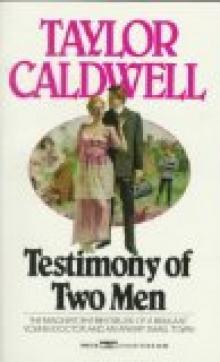 Testimony of Two Men
Testimony of Two Men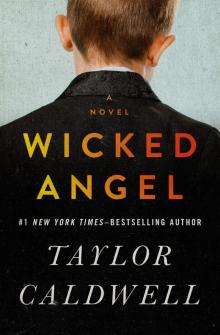 Wicked Angel
Wicked Angel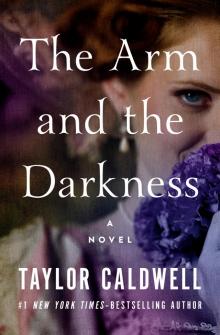 The Arm and the Darkness
The Arm and the Darkness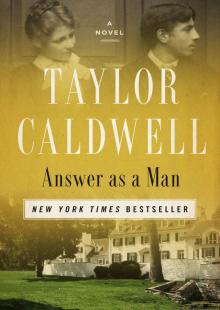 Answer as a Man
Answer as a Man Grandmother and the Priests
Grandmother and the Priests On Growing Up Tough: An Irreverent Memoir
On Growing Up Tough: An Irreverent Memoir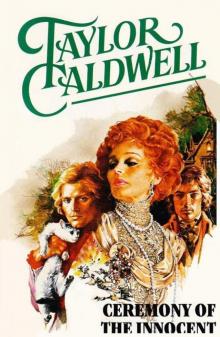 Ceremony of the Innocent
Ceremony of the Innocent The Listener
The Listener Bright Flows the River
Bright Flows the River The Earth Is the Lord's
The Earth Is the Lord's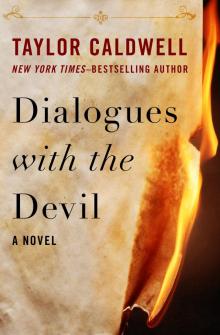 Dialogues With the Devil
Dialogues With the Devil A Tender Victory
A Tender Victory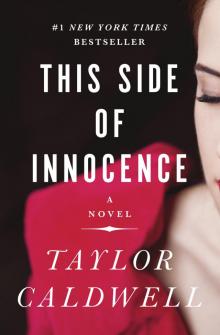 This Side of Innocence
This Side of Innocence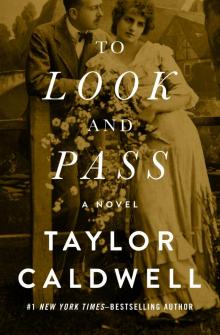 To Look and Pass
To Look and Pass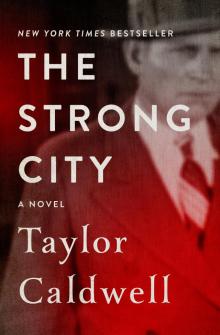 The Strong City
The Strong City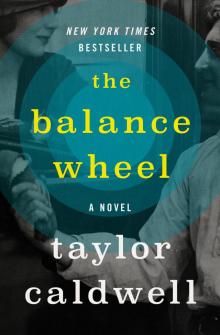 Balance Wheel
Balance Wheel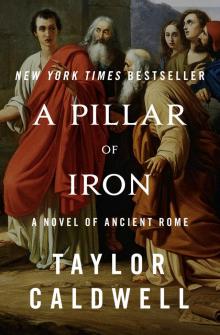 A Pillar of Iron: A Novel of Ancient Rome
A Pillar of Iron: A Novel of Ancient Rome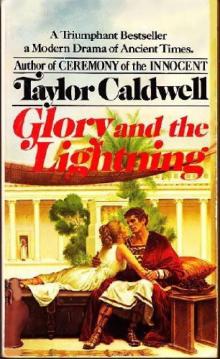 Glory and the Lightning
Glory and the Lightning Dear and Glorious Physician
Dear and Glorious Physician The Wide House
The Wide House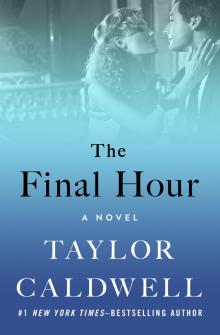 The Final Hour
The Final Hour Never Victorious, Never Defeated
Never Victorious, Never Defeated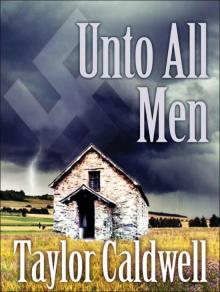 Unto All Men
Unto All Men The Turnbulls
The Turnbulls Your Sins and Mine: The Terrifying Fable of a World Without Faith
Your Sins and Mine: The Terrifying Fable of a World Without Faith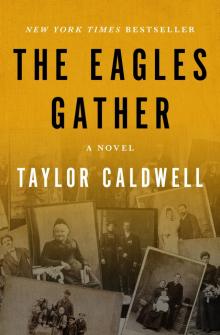 The Eagles Gather
The Eagles Gather Let Love Come Last
Let Love Come Last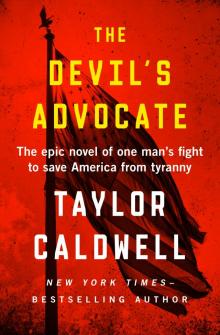 The Devil's Advocate: The Epic Novel of One Man's Fight to Save America From Tyranny
The Devil's Advocate: The Epic Novel of One Man's Fight to Save America From Tyranny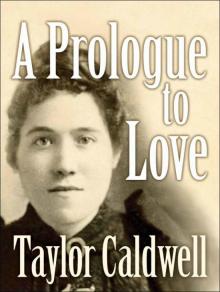 A Prologue to Love
A Prologue to Love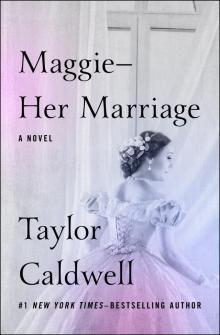 Maggie: Her Marriage
Maggie: Her Marriage The Late Clara Beame
The Late Clara Beame Melissa
Melissa Great Lion of God
Great Lion of God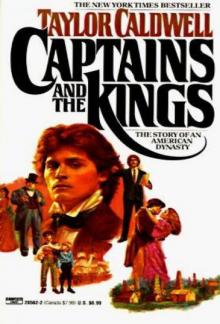 Captains and the Kings
Captains and the Kings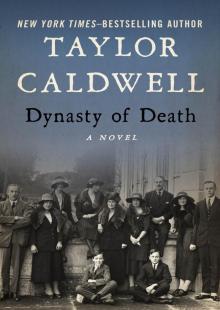 Dynasty of Death
Dynasty of Death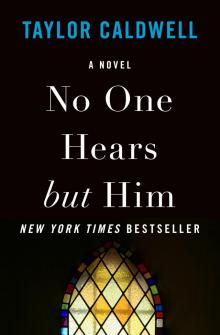 No One Hears but Him
No One Hears but Him The Sound of Thunder
The Sound of Thunder There Was a Time
There Was a Time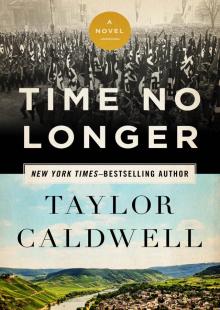 Time No Longer
Time No Longer I, Judas
I, Judas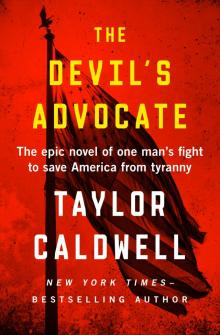 The Devil's Advocate
The Devil's Advocate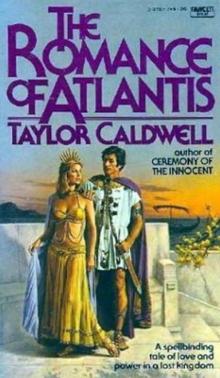 The Romance of Atlantis
The Romance of Atlantis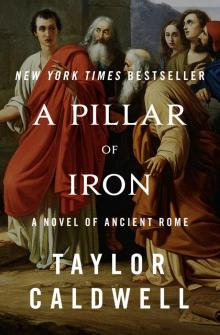 A Pillar of Iron
A Pillar of Iron On Growing Up Tough
On Growing Up Tough Your Sins and Mine
Your Sins and Mine